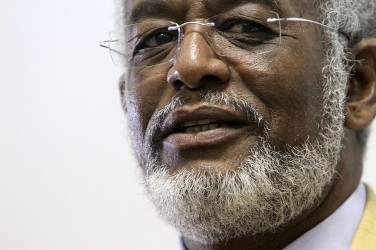Sudan says cessation of support to rebels prerequisite to peaceful relations with south
March 29, 2012 (KHARTOUM/JUBA) — Sudan’s foreign minister Ali Ahmed Karti reaffirmed that talks are the only choice Juba has to settle the disputed issues between the two countries but warned that being peaceful neighbours involves stopping any support to rebel groups operating in Sudan.

The Sudanese army repulsed an attack on Monday 26 March on Heglig oil field, which produces 60,000 barrel per day, around the half of Sudan’s production. Khartoum said the assault was carried out by the South Sudanese army and Sudanese rebels. On Monday South Sudan’s president, Salva Kiir, claimed his country’s army was responsible for the attack.
Different sources in Juba told Sudan Tribune that the announcement of the attack by Kiir had caused consternation among ministers and members of the government because the cabinet, in an extraordinary meeting earlier on Monday, had decided to work with Khartoum for a negotiated settlement over the pending issues and to support the efforts of the chief negotiator, Pagan Amum.
South Sudan’s security services are being accused of mounting the attack on Heglig with the Sudanese rebels who were annoyed by the recent deals reached by the negotiating teams of the two countries in Addis Ababa and the announced visit of the Sudanese president to Juba.
Speaking after the return of the Sudanese delegation from Bagdad, the Sudan’s foreign minister Ali Karti told reporters in Khartoum that “the only way available to the government of the South Sudan is a return to the negotiating table.” Pointing out that the attack on Heglig contradicts with the message brought by its delegation led by Pagan Amum, last week.
Karti went to say that the attack on Heglig reveals “the deep divisions in the ranks of the Government of South Sudan and indicates that there are parties who do not want the voice of peace to prevail.”
The minister stressed further that the will of those who came to Khartoum to invite Bashir to visit Juba was overshadowed by others who wanted to stop the rapprochement between the two countries.
He pointed out that President Salva Kiir committed a big mistake “when he went overjoyed to announce during a public meeting saying ‘We have got what we want to be reached through negotiations’, even without checking and make sure that the attackers have controlled or not Heglig effectively.”
On Monday 26 March Kiir said his government contests Sudan’s sovereignty over Heglig and wanted to discuss the issue peacefully with Khartoum but the South Sudanese army repulsed an attack by the Sudanese army and now control the Heglig.
Karti further said the Sudanese army “repelled the attack and is ready for dialogue if the other party is serious.” He stressed that what happened was an attempt by the rebels to pressure Juba’s government.
Regarding the Sudanese rebel groups, the minister said Juba harbours Darfur and South Kordofan rebels and this represents “clear intentions of aggression”.
Referring to the efforts carried out by the African Union in Addis Ababa, Karti said the technical committees meeting there should focus on the security issue before to go through the other files.
In Juba, reliable sources said the SPLM Secretary General and top negotiator was one of those who reacted negatively against the reports by intelligence services about the attack and its circumstances.
The issue shows that the Sudanese rebels can impact on the South Sudan government, said a Western diplomat. The added that Juba’s leaders should not believe it can use their former comrades who fought together with them against Bashir’s government without such risk.
He further warned that the “card of regime change” played by Juba might discredit its leadership before the international community which seeks to bring peace and stability in the region.
“This is why we endorsed the South Sudanese will for an independent nation several months ago,” he said.
(ST)
